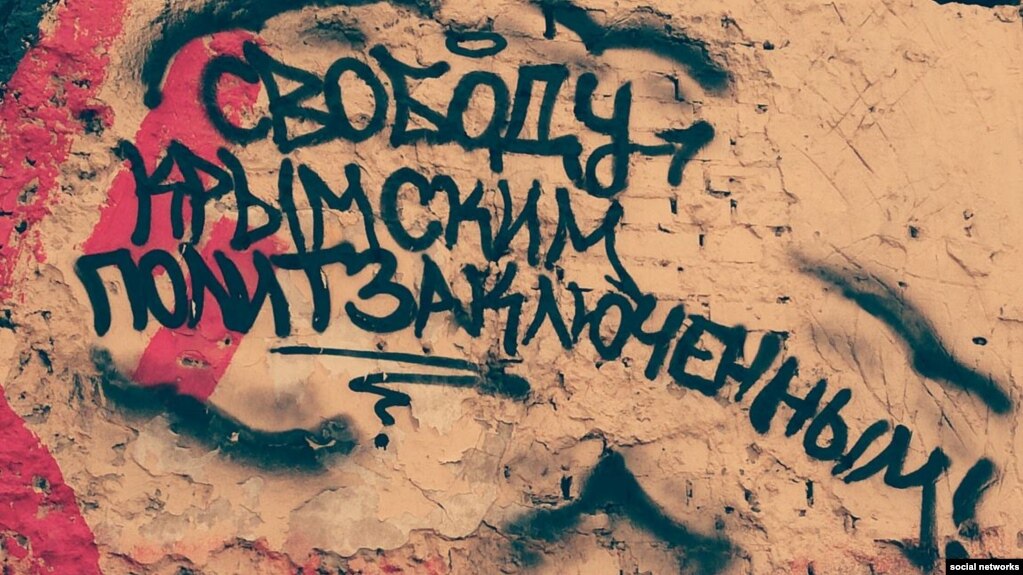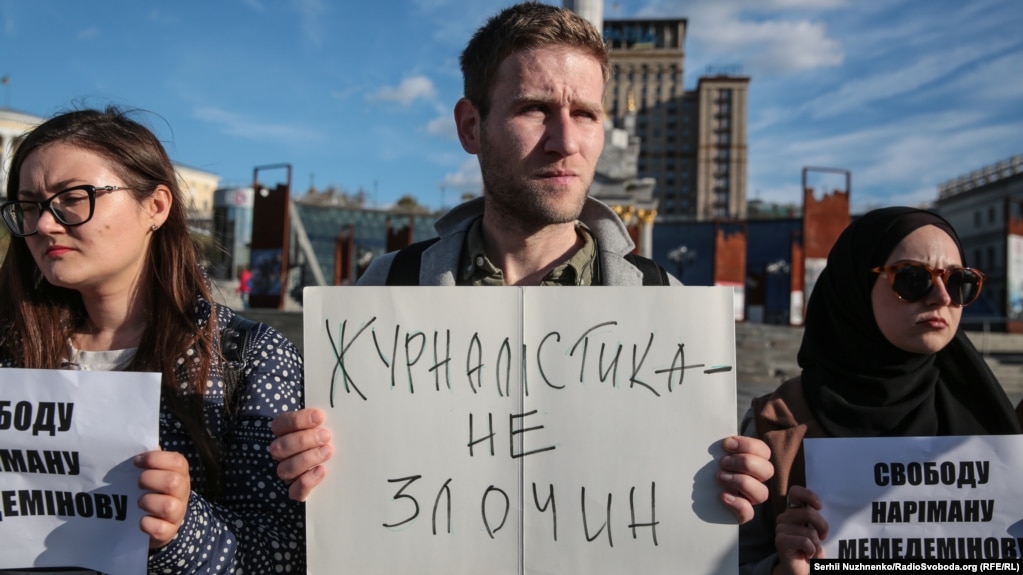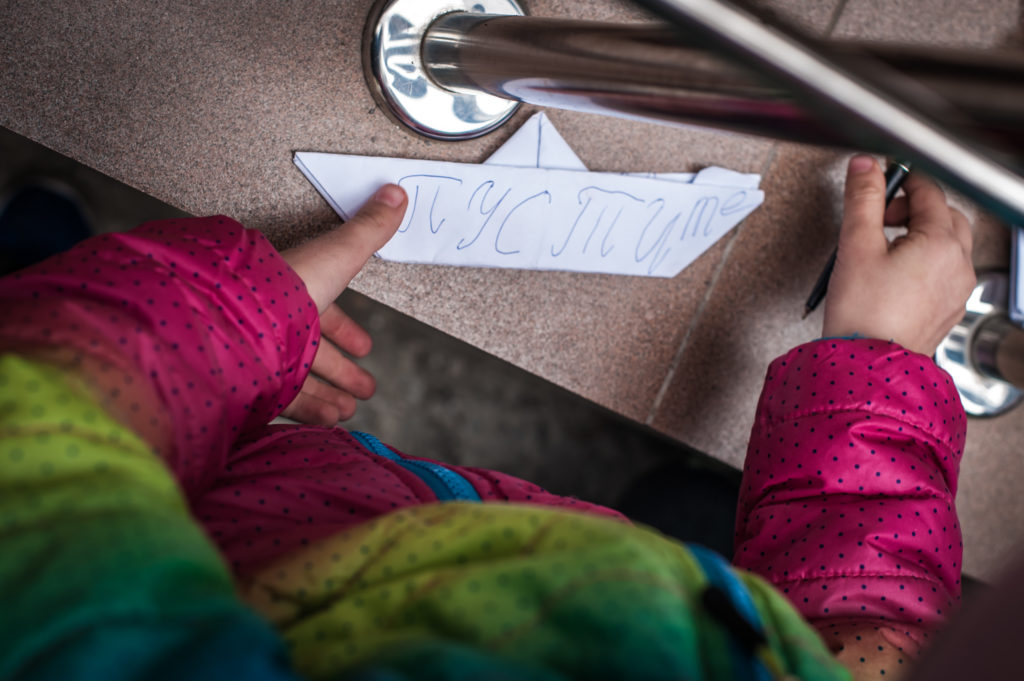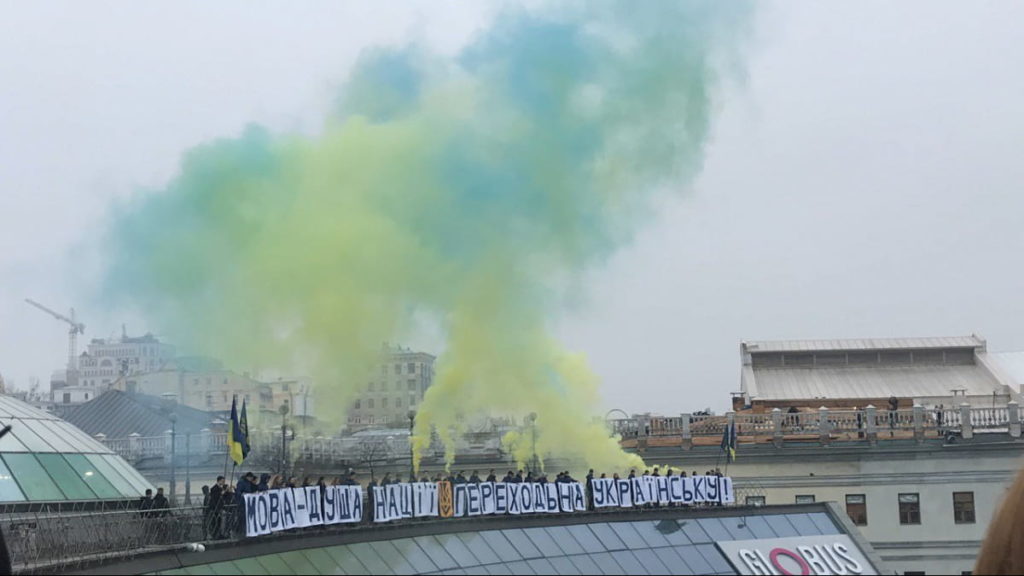
Insufferable life in Crimea: target groups for the Russian law enforcement service
29 / 07 / 2021Oles Lisichkin
People in and outside of Ukraine do not know much about activism in occupied Crimea or systematic violations of rights of Crimean residents by the occupying authorities of the Peninsula. We have prepared this text to briefly describe the current situation with human rights in Crimea. This text will touch on the following categories of people:
- People who do not like the fact of Russian occupation and express pro-Ukrainian views;
- Independent media and journalists;
- Crimean Tatars;
- Victims of religious persecutions;
- People who fight for the preservation of the Ukrainian language, culture, and identity.
People who do not like the fact of Russian occupation and express pro-Ukrainian views
Since the beginning of the occupation, there were demonstrations in multiple Crimean cities supporting Ukrainian territorial integrity. Back then, pro-Russian forces kidnapped Reshat Ametov, Andrii Shchekun, Anatolii Kovalskii, Yurii Hruzinov, Yaroslav Pylunskii, Oleksii Hrytsenko, Serhii Suprun, Natalia Lukianchenko, and others. Reshat Ametov was found dead twelve days after the kidnapping. Although demonstrations in support of the territorial integrity of Ukraine happened in multiple countries, it was Crimea where the Russian system of repressions targeted those demonstrations.
In May 2014, Tymur Shaimardanov and Seiran Zinedinov created an organization "Ukrainian people's house." This organization aimed to united pro-Ukrainian Crimeans. On May 26, Shaimardanov disappeared; Zinedinov participated in searches. Four days later, Zinedinov disappeared as well.
The case of former officers of the Military Navy Forces of Ukraine Oleksii Bessarabov, Volodymyr Dudko, and Dmytro Shtyblikov is very noticeable. All three of them were charged with preparation for subversions and illegal keeping of explosives. Human rights defenders registered illegal methods of investigation as well as the use of tortures to receive confessions. Dmytro Shtyblikov was sentenced to 5 years in prison, Oleksii Bessarabov and Volodymyr Dudko were sentenced to 14 years in prison.
Independent Journalists
Crimean occupying authorities create multiple barriers for independent journalists. Journalists receive threats in case their rights are violated. They cannot be sure that there will be a fair (or any) investigation. During 2020 there were at least 58 cases of attacks and threats against independent media and journalists.

The main source of threats for media are representatives of occupying authority (50 cases out of 58). The most common method of pressure – charges on extremism, rehabilitation of Nazism, high treason, connection with terrorists, incitement to hatred, calls to a coup. Journalists also often face charges with "calls to action, aimed at violation of territorial integrity of the Russian Federation" and espionage.
Journalist Vladyslav Yesypenko was detained on March 10, 2021, for "taking pictures and videos of the territory, critical infrastructure, and places of mass concentration of people." He was also charged with “subversive reconnaissance activity in favor of Ukrainian security services." According to FSB, law enforcement serviced has allegedly found a grenade in Yesypenko’s vehicle. According to Yesypenko, he was tortured with electrocution and suffered other illegal methods of interrogation.
On the institutional level, right after the occupation of Crimea, the local media appeared within the sphere of influence of Russian legislation on media. Some media outlets were forbidden; others had to go through a re-registering procedure according to the Russian legislation. As of April 1, 2015, there were 232 media outlets registered in Crimea. Before occupation, Crimea had around 3000 media outlets.
Russian occupying authorities actively block Ukrainian FM radio frequencies. In March 2021, the signal from the Ukrainian FM stations reached 13 out of 19 towns in Crimea. In June this number reduced to 8 towns. According to the Crimean Human Rights group, at least 25-30 Ukrainian websites are permanently blocked in occupied Crimea. The list of blocked websites includes the Ministry of Reintegration of Temporary Occupied Territories and some popular online media such as "Ukrainska Pravda,” “Censor,” and the website of the Mejlis of Crimean Tatar people.
Crimean Tatars
The occupying authority conducts discrimination of Crimean Tatars on the institutional, personal and preventive levels. Any attempts of self-organization that are outside of the Russian control meet resistance:
- The Mejlis of Crimean Tatar people1 was recognized as an extremist organization and therefore, prohibited;
- The Spiritual Directorate of Muslims of Crimea appeared under control of the occupying authority;
- A number of Crimean Tatar media were denied registration (TV Channels “ATR” and “Liale,” informational agency QHA, radio “Meidan," informational websites "Qirim-Vilayeti.org" and "qirimtatar.org" etc.)
- Russian authorities persecute organizers of the demonstration in support of the territorial integrity of Ukraine – “the case of February 26."
According to CrimeaSOS, out of 122 politically motivated criminal cases, 90 cases target Crimean Tatars specifically. Out of 15 missing victims of forced disappearances, 10 are Crimean Tatars. Moreover, all six victims of forced disappearances who were found dead are Crimean Tatars.

This, for example, was how Ervin Ibrahimov got kidnapped on May 26, 2016. Ibrahimov was an activist, a deputy of the local council, member of the executive committee of the World Congress of Crimean Tatars. The fate of Ibrahimov remains unknown to this day.
“Preventive” discrimination is a creation of an atmosphere of fear and stimulation of xenophobia towards Crimean Tatars:
- Relatives of political prisoners get administrative fines. For example, the "court" fined the mothers of three political prisoners for participation in one-person protests. The “court” treated those protests as “mass gatherings”;
- With hate speech, Russian media create an image of Crimean Tatars as "enemies of the people." This further stimulates discrimination;
- Crimean Tatar language was first forbidden in schools, and now it is forbidden in courts. For example, the "court" expelled the accused from the courtroom for speaking in the Crimean Tatar language. This happened despite the fact that the "constitution" of the so-called "Republic of Crimea" recognizes Crimean Tatar as a "state language" in Crimea along with the Ukrainian and Russian.
In response to pressure against Crimean Tatars, a group of activists, lawyers, and relatives of the prisoners created a civic movement, "Crimean Solidarity.” The reaction of the occupying authorities was the arrests of activists for alleged involvement in the organization called "Hizb ut-Tahrir.” This organization is legal in most countries of the world, but Russia considers it a terrorist group.
Victims of religious persecution
In addition to Crimean Tatars who follow the religious tradition, the Orthodox Church of Ukraine and Jehovah's Witnesses became the main victims of religious persecution.
As mentioned above, Russia recognized “Hizb ut-Tahrir” as a terrorist organization. This allows the occupying authorities to start criminal investigations against members of this organization in Crimea. In addition, other religious Crimean Tatars who are not members of “Hizb ut-Tahrir" are often treated and persecuted as members of that organization. Accusations of "extremism" and "terrorism" allow the occupying authorities to sentence the accused to terms up to 19 years.
In 2014 the Russian occupying authorities began installing surveillance cameras in mosques, tracking people who attend mosques, conducting regular searches in mosques, and mass arrests. The occupying authorities conduct searches in mosques and madrasahs. On January 28, 2016, a group of armed people surrounded the mosque in Simferopol. On May 6, 2016, a group of armed people detained over 100 Muslims after the service.
Imams face constant pressure. A possible goal of this pressure is to put the religious communities under the control of the Russian Spiritual Directorate of Crimean Muslims. For example, between June 2020 and June 2021, Yusuf Ashyrov, the imam of the Muslim community “Alushta,” was fined three times for an “illegal missionary activity.”
The Orthodox Church of Ukraine faces pressure as well. Occupying authorities take away buildings, limit access to the property, and set unrealistically high rent prices.
Since the beginning of the occupation, Russian authorities demanded that the Orthodox Church of Ukraine go through registration according to the Russian legislation. As a result of that registration, the church would lose the benefits of a religious institution. Furthermore, Russian occupying authorities confiscated all the property of the Orthodox Church of Ukraine in Crimea because the Church is not registered as a religious institution.
Some "court" decisions demanded the removal of the parish of Simferopol from the building of the church (250 parishioners) and the demolition of the church in Yevpatoria (100 parishioners). In contrast to the pre-occupation time, by 2020, the number of parishes reduced from 49 to 5, the number of priests reduced from 22 to 4.
In November 2018, the occupying authorities started criminal persecution of Jehovah's Witnesses. The organization "Jehovah's Witnesses" was recognized as an extremist organization in Russia and Crimea.
As of today, there are criminal cases against nine people who are accused of participation in an extremist organization. Three of those people were sentenced to 6.5 years in prison. Five accused remain under home arrest.
In 2019 Krishnaite songs in Sevastopol forest became a reason for the denunciation to the anti-extremist department of the Russian Interior Ministry. Two persons were fined five thousand RUB for an "illegal missionary activity." The only evidence that the accusers had was a video of singing that Krishnaites published on a social network. Prohibition of missionary activity and punishments for it became common.
Apart from examples of intolerance by the occupying authorities listed above, daily chauvinism is being cultivated as well. For example, some religious communities often get stigmatized as sects, extremists, terrorists. According to Oleksandr Sedov, the Crimean Human Rights group analyst, the occupying authorities often treat any statements against the Russian Orthodox Church as hate speech against religious groups. Any other hate speech towards other religious groups does not receive punishment.
People who fight for the preservation of the Ukrainian language, culture, and identity
Activists and other citizens who participated in celebrations of the Day of the State Flag of Ukraine and the Birthday of Taras Shevchenko, Vyshyvanka Day, faced persecution. For example, on March 9, 2015, Russian occupying authorities detained three activists who participated in a sanctioned celebration of Tatar Shevchenko's birthday – Leonid Kuzmin, Oleksandr Kravchenko Valdar Shukurdzhyev. They were detained for using Ukrainian symbols, the Ukrainian flag, and holding a sign that said: "Crimea is Ukraine."
The Ukrainian language is being actively marginalized. This process begins in schools where administrations refuse to create Ukrainian-language classes. During the 2018-2019 academic year, there were 200.700 students in 544 secondary schools of the so-called "Republic of Crimea." 194.400 students received education in the Russian language of instruction (96.7%), 6100 students received education in the Crimean Tatar language (3.1%), and 249 students received education in the Ukrainian language of instruction. In 2020 there was a single school in Crimea that taught the Ukrainian language as a subject. This, however, was just a formality. According to the accounts of locals, that school taught Ukrainian only on paper.
Any demonstration of the Ukrainian national symbols is forbidden. Volodymyr Balukh is a Crimean farmer who flew a Ukrainian flag above his house. He also attached a plate saying "Street of Heroes of Heavenly Hundred" to one of the walls of his house. Balukh was detained and sentenced to 4 years and 11 months in a penal colony. He was also fined for alleged keeping illegal weapons and ammunition and disorganization of work of the detention center. Balukh was released during the prisoners' exchange between Russia and Ukraine.
In 2019 FSB searched the house of a Crimean resident Oleh Prykhodko. Russian security services confiscated Ukrainian symbols. That same year Prykhodko was arrested for an alleged preparation for a terrorist attack and manufacturing of explosives. On March 3, 2019, a 62-year old activist was found guilty and sentenced to 5 years in a maximum-security penal colony.

To sum up, the occupying authority has created a clear system of political persecution, which selectively implements the norms of Russian legislation. The scale of persecution shows that all possible state institutions are involved: police, FSB, "courts," local "authorities," and even illegal armed formations such as "Crimean self-defense."
As of today, Russian changed its approach to political persecution. At this time, the most common method of persecution is an accusation of "espionage" and "high treason." Apparently, the fact that many victims hold illegally distributed passports of the Russian Federation enables these accusations. People who Russia treats as Russian citizens can be accused of "high treason." Meanwhile, Russian treats the Ukrainian citizens in Crimea as foreigners. Therefore, they are accused of espionage.
The reason for this kind of approach is twofold: 1) espionage and high treason allow sentences to long terms of imprisonment; 2) those accusations create an image of Ukrainians and Crimean Tatars as “external enemy” for Crimean residents and Russian citizens, which in turn mobilizes pro-Russian support.
Finally, we should note that all the criminal cases mentioned above involve multiple violations of the international standards of prosecution and Ukrainian legislation. Moreover, those criminal cases violate even the norm of Russian legislation and the so-called "constitution" of the so-called "Republic of Crimea."